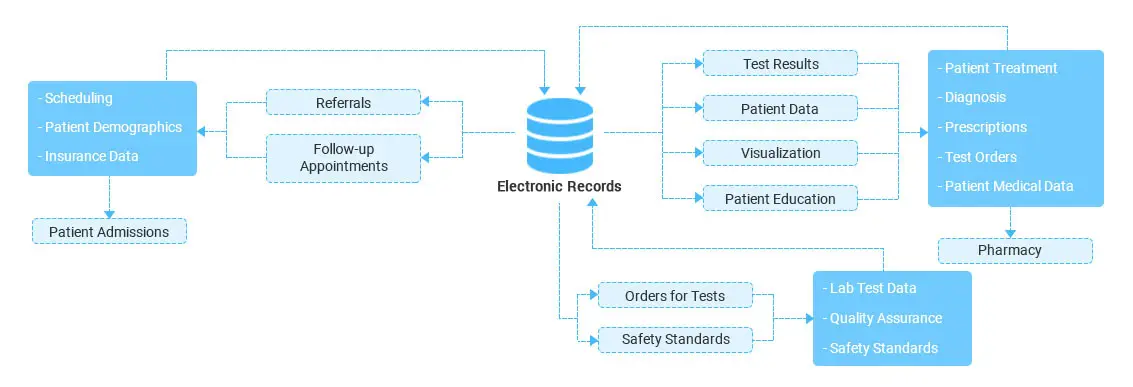Hospitals are concerned with their patient's lives and health. Well-trained physicians and a wide range of facilities and equipment are essential components of good medical care. Without precise information, Health workers may not provide comprehensive, up-to-date, and accessible medical records, may not provide the best treatment or may misdiagnose a condition, which can have serious consequences.
If individuals are insured, medical records management ensures acceptable healthcare procedures are commercially available to the general public.
Medical records management primarily entails enhancing the quality of patient treatment while keeping the cost down. It is the convergence of the patient-provider relationship, and it is one of the critical responsibilities of a hospital administration.
The objectives of medical record management systems in university hospitals are to identify good practices in managing records, assess the staff's skill in managing medical records appropriately, and see medical record management programs contribute to quality decision-making.
We have all been overwhelmed with constant Healthcare interpretation of the pandemic and response throughout 2020, and into 2021, extravagant facts accompanied with insight into what else could have been done better.
The current state of health information systems is highly fragmented. While a plethora of sources are producing vast numbers of personal healthcare data right from healthcare professionals to pharmacies, laboratories to hospitals, and even our mobile phones and smart devices, the information is almost always isolated within records which are segregated and inaccessible from outside the confines of closed and proprietary systems.
Blockchain technology is becoming increasingly popular in healthcare institutions, which recognize its revolutionary potential.
A single global blockchain is a facility that can serve as the core principle for a unified international Medical records platform, providing a secure digital world designed to process and maintain patient data in a logical step and making it publicly accessible in real-time to everybody in the healthcare service provider chain.
In healthcare, blockchains can be applied in five different ways:
-
Managing data from electronic medical records (EMRs):
An electronic health record (EHR) system provides a decentralized way to manage authentication, credentials, and data exchange across health professionals.
-
Security measures in the healthcare field:
It's used to store transaction records securely across multiple computers in a community network without the assistance of a neutral party.
-
Database management for medical records:
Medical and health data professionals analyze and record established domains and identify the trail of medication supply with complete transparency.
-
Administration of biotechnology at the point of care:
The biological data breach has become a big issue as more companies deliver Genetic analysis to individuals. This is avoidable using blockchain and creating an online marketplace where scientists can acquire biological data for research reasons. This could encourage secure selling while obviating the need for costly intermediaries.
-
Data processing for electronic health records:
Blockchain has the potential to create a single platform for storing and retrieving medical information in a protected and timely manner by authorized users. Countless blunders are avoided, faster diagnoses and interventions are possible, and care can be individualized to each patient by eliminating misinterpretation among multiple healthcare personnel associated with caring for the same patient.
Regardless of whether medical data is stored directly on the blockchain with privacy protections or off-chain and operated through on-chain authorized users, a blockchain-based structure of electronic health records will not only allow healthcare providers to take a holistic view of medical data and generate better health outcomes, but it would also reorganize the data framework.
Blockchain solutions can help assure transparency and integrity in creating medical drugs, which is a time-consuming process requiring stringent integrity of the data or “hygiene” checks.
Extensive research, as well as possibly billions of funds and years of hard work, can be thrown out if a patient's medical data is not recorded correctly, or worse, is purposefully created or misrepresented.
As a result, Blockchain technology allows for easy, auditable tracking of datasets generated by clinical researchers, which benefits government agencies responsible for authorizing drugs and improving patient health outcomes.
CONCLUSION:
A blockchain with a robust framework to enable prominent data ability is critical to realizing this ambition for better health. Instead of getting numerous digital databases for the industry and quality healthcare outcomes necessitate a single global blockchain which loops enormously and is exceptionally efficient maintaining large volumes of data to serve as a single source of information, ensuring that everyone in the healthcare service chain has access to the same data at the same time.
It's a massive ambition for healthcare, and it is only realized with the help of a blockchain that's promoting an even bigger vision.






